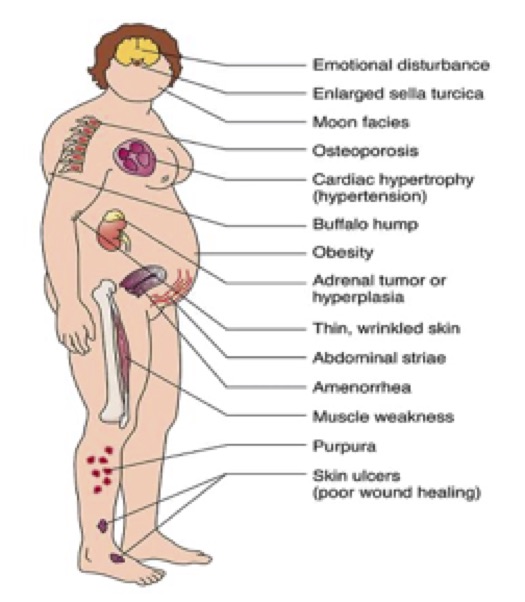The condition of cortisol excess is called Cushing’s syndrome. It can be due to excess secretion of cortisol either due to a problem in adrenal gland itself or due to excess secretion of ACTH, the Pituitary hormone that controls cortisol secretion.
In some rare occasion, ACTH can come from tumours from another part of the body, benign or malignant. However, the most common reason being the condition called iatrogenic Cushing’s which is caused due to excess intake of steroid drugs for some reason like allergy, asthma or chemotherapy.


Common signs and symptoms involve progressive weight gain and skin changes, such as:
Blood tests:
Urine tests:
Imaging tests. Computerized tomography (CT) scans or magnetic resonance imaging (MRI) scans can provide an image of pituitary and adrenal glands to locate abnormalities, such as tumours.
Treatments for Cushing syndrome are designed to lower the high level of cortisol in your body. The best treatment for you depends on the cause of the syndrome. Treatment options include:
Medications: Medications can be used to control cortisol production when surgery and radiation don’t work or making the patient ready for operation. Medications to control excessive production of cortisol at the adrenal gland include ketoconazole (Nizoral), mitotane (Lysodren) and metyrapone.
Whatever the source or treatment, patients with Cushing’s syndrome should be followed up by Endocrinologist lifelong. Your Doctor will tell how often and what tests are to be done.
Also see,
We are at home for quite sometime now due to Covid 19 pandemic, trying our…
What is Trans fat? Trans fat is considered the worst type of fat we can…
As per the current practice in INDIA, when you are positive you will be in…
Red Bell Peppers Use bright bell peppers in Indian or continental cuisines to keep your…
What are sex hormones? Hormones which are secreted by the testis in males and ovaries…
How does Obesity worsen the general condition? Obesity is one of the major risk factors…